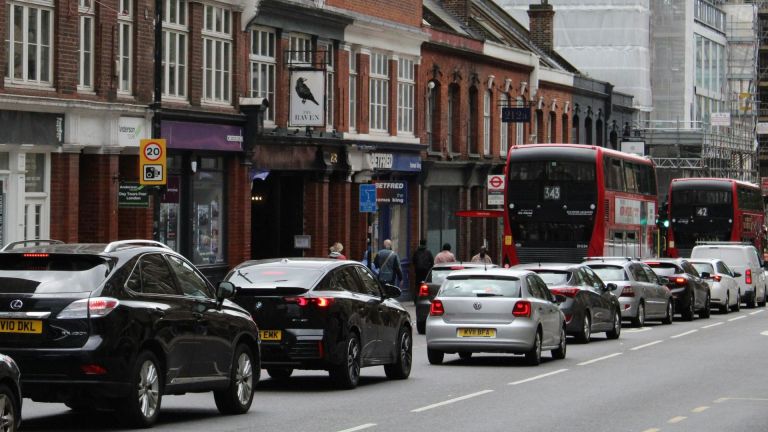You cannot use universal credit for childcare if you already receive tax-free childcare.
If you live with a partner, you both need to be in paid work, unless your partner cannot look after your children.
This means you can claim childcare costs if your partner has a health condition or disability which means they have limited capability for work or limited capability for work-related activity.
Similarly, if your parent is eligible for carer’s allowance or if your partner has to be away from home temporarily (for example, if they are in hospital) you are eligible.
It does not matter how many hours you work – there is no minimum – but it must be paid work, so you’re not eligible if you are volunteering and only getting money for expenses.
If you receive statutory sick pay, you may also be eligible for childcare help from the DWP.
Advertising helps fund Big Issue’s mission to end poverty
You may also be eligible if you’re getting statutory maternity pay, statutory paternity pay, statutory shared parental pay, statutory adoption pay or maternity allowance.
You can claim childcare costs for all the children you’re responsible for, until the 31 August after their 16th birthday.
What childcare costs does universal credit cover?
To have your childcare covered by universal credit, your provider must be registered with Ofsted.
This includes registered childminders, nurseries, nannies, after-school clubs and play-schemes, schools or home care workers working for a home care agency. This also includes holiday clubs, after-school clubs and breakfast clubs.
Universal credit will cover ‘reasonable’ childcare costs that help you work or get into work. That could include a ‘settling-in period’ before you start work, so your child can get used to being in childcare, childcare while you travel to work, and childcare in the month after you lose a job.
How do I claim the costs of childcare back from universal credit?
You can report childcare costs on your online universal credit account.
Advertising helps fund Big Issue’s mission to end poverty
You should try to do this as soon as the payment is made, because if you leave it for more than two months, you may not get the money back.
To prove your payments, you will need to show the dates of childcare you are paying for, how much you paid and when you made the payment.
This can be done using a paid invoice or by showing bank statements, receipts or invoices from the childcare provider.
How do I get my childcare payments upfront from universal credit?
Under the flexible support fund, parents receiving universal credit can get funding for their childcare upfront.
This is only applicable to a parent who is starting work or who is increasing the hours they work, such as if they are moving from part-time work to full-time work.
You do not have to pay back money from the flexible support fund.
Advertising helps fund Big Issue’s mission to end poverty
You can then claim up to 85% of those childcare costs to be paid with your universal credit. That could give you money towards the next month’s childcare costs.
When do I receive the money?
If you are not eligible for the flexible support fund, you have to cover the costs of the childcare yourself. Then, after the childcare has happened, you can report the costs to universal credit.
If you pay for childcare after it’s been provided, the government will pay back your costs in the same month that you report them.
You can claim back up to three months of past childcare costs at one time – but if you’re claiming for more than one month you might not get all the money back.
You can also claim back up to three months of future childcare costs at a time. The government will pay these costs back month by month, not in one lump sum.
Payments for childcare costs are included in the total monthly universal credit payment.
Advertising helps fund Big Issue’s mission to end poverty
That total payment can go up or down, depending on how much you earn from work. So, if you earn more than usual in one month, your total universal credit payment might go down, including the amount you get for childcare costs.
What if I am not eligible for the flexible support fund but need my childcare costs paid upfront?
If you are not eligible for the flexible support fund but still need help paying for your childcare in advance, you can apply for a budgeting advance.
A budgeting advance is a loan which is repaid through your regular universal credit payments – your payments will be lower until you pay it back. The government will tell you how your payments will be reduced by.
The first deduction is made on the day you get your next payment.
If you no longer get universal credit you will need to repay by other means, such as from wages or other benefits you may be getting.
You will have to repay the budgeting advance within 12 months.
Advertising helps fund Big Issue’s mission to end poverty
The smallest amount you can borrow is £100. You can get up to £812 if you have children.
Can you get 30 hours free childcare on universal credit?
You can get 30 hours of free childcare at the same time as claiming universal credit, but only if you, and your partner (if you have one) are working, on sick leave or annual leave or on shared parental, maternity, paternity or adoption leave.
You are only eligible if, over the next three months, you and your partner (if you have one) each expect to earn at least £2,167 if you’re aged 23 or over, £2,117 if you’re aged 21 or 22, £1,557 if you’re aged 18 to 20 or £1,098 if you’re under 18 or an apprentice.
This is the National Minimum Wage or Living Wage for 16 hours a week on average.
Therefore, children whose parents earn less than £8,650 each per year are not eligible for the scheme.
You can use an average of how much you expect to earn over the current tax year if you work throughout the year but do not get paid regularly or you’re self-employed and do not expect to earn enough in the next three months.
Advertising helps fund Big Issue’s mission to end poverty
How do you get free childcare for two-year-olds if you’re on universal credit?
All children aged between three and four currently get at least 15 hours of free childcare each week, for 38 weeks of the year.
In April 2024, the 15 hours free childcare scheme will be expanded to two-year-olds whose parents are working.
If you are claiming universal credit, you can still receive free childcare for your two-year-old.
However, your household income must be £15,400 a year or less after tax, not including benefit payments.
Usually, it’s 15 hours a week for 38 weeks of the year, but you might be able to take fewer hours over more weeks if your childcare provider allows it. It works out at 570 free hours per year.
What other help is available?
If you are interested in other affordable childcare options in your area, it is best to visit your local council’s website. Council activity groups are quite often free or cheap. Some offer discounts if your child attends for a full week or subsidies for low-income families.
Advertising helps fund Big Issue’s mission to end poverty
Your local council may also run a holiday activities and food programme to support low-income families when the children are on school holidays. This provides “healthy food and enriching activities” to children who are eligible for free school meals.
Find out more about universal credit and free childcare schemes through the Childcare Choices website.










